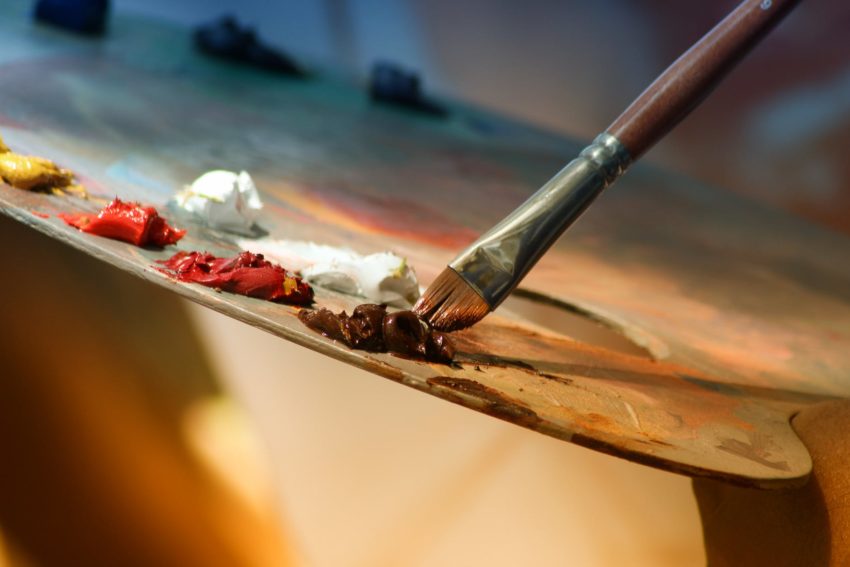Overview
Spanning all cultures and an ever-expanding range of art styles, painting is now a vibrant part of contemporary fine art practice, which has experienced a renewed interest in recent years.
Major institutions and galleries, such as the Tate, have featured painting significantly over the past decade and it has benefited from an increasing presence in art journals. Elsewhere in the wider world, influential new painting has emerged from eastern Europe and China. Gaining a new relevance and focus, the discipline is viewed as a rich, complex language of its own.
Coventry School of Art and Design has taught art and design for over 150 years. Outward looking in attitude, this master’s course will encourage you to learn first-hand about painting and the art world in major British, European and worldwide centres. You will join our vibrant, creative community, which has already provided a wide range of exciting opportunities for our previous graduates, including painting, residency, exhibition opportunities, community work, curating and the development of PhD and research.
Why Coventry University?
An award-winning university, we are committed to providing our students with the best possible experience. We continue to invest in both our facilities and our innovative approach to education. Our students benefit from industry-relevant teaching, and resources and support designed to help them succeed. These range from our modern library and computing facilities to dedicated careers advice and our impressive Students’ Union activities.
Course information
Based around the development of your individual practice, the core ethos of this master’s is to enable you to harness your personal development and creative ambitions. We want to help you discover what kind of artist you want to be, so that you can flourish within the scope of contemporary painting and the broader cultural realm.
During the course, you will take two dedicated painting modules in which you will develop your personal painting practice. We aim to extend your knowledge of paint as a material and process, introducing a range of disparate approaches to painting – from realism to abstraction, material to conceptual.
Guided and supported by accomplished practitioners, you will be given opportunities to test and explore a range of ideas and issues relating to the traditions of painting. We encourage you to work in a range of media, including paint media, print, photography and digital technologies, as appropriate and depending on your own interests.
You will also undertake modules in contextual studies and professional practice, which are part of the wider Creative Arts MA programme in the Design and Visual Arts section of the School of Art and Design. These modules will help you contextualise your practice, gain research skills and undertake professional activity.
The course culminates with the common MA Project module, which comprises one-third of the course and takes the form of a personal project. Your final project will be tailored to your own area of professional practice and your personal creative passion, which will form the basis of an exhibition of your work in the end-of-year MA Degree Show. With a view to developing your professional profile, these shows are open to the public and attended by curators and other art world professionals.
Why choose this course?
Declared dead in 1839 by the French painter Paul Delaroche, on examining the results of early experiments in photography, painting has experienced something of a revival in the 21st century.
Over the last 50 years or so, fine art practice has grown to encompass work in a huge range of media, often interdisciplinary, merging traditional art forms, like painting and sculpture, with newer disciplines like photography, video and computer imaging, among others. However, the rise of technology which caused painting to be viewed as outmoded by some is now responsible for renewed vigour in the subject.
The fact that technology has become more and more ubiquitous, embedded in all areas of work and life, has caused many across the art world to reconsider and reappraise traditional disciplines, such as painting, within the broader culture of art and design. Painting involves itself with substance, with physical making and manipulation, something which technology cannot do. Young artists are seeking to redefine painting in the digital age as an important means of modern cultural production is becoming more pronounced.
Responding to this perceived shift in attitudes, our course adopts a more ‚disciplinary’ approach to study, where painting is considered as a distinct language and standalone discipline capable still of expressing ideas and human experience in a way not possible in other media.
It will develop, extend and challenge your individual practice as a painter, both technically and conceptually. You will learn about the historical contexts of painting and investigate the potential of the practice of painting as part of contemporary discourse.
Encouraged to work in media relevant to your own interests and ideas, your studies will be underpinned by lectures with staff, who are themselves accomplished artists with expertise in a range of approaches to painting as a discreet discipline. They have exhibited widely in the UK and abroad, including the Royal Academy of Arts London, Tate Gallery London, Prague Biennale, Metropolitan Museum of Art New York and Soho House Los Angeles.
Zobacz więcej na stronie uniwersytetu >>
Wiza studencka do Wielkiej Brytanii
Aby studiować w Wielkiej Brytanii potrzebujesz wizy studenckiej. Aby złożyć wniosek o taką wizę studencką musisz zdjać certyfikat językowy na poziomie B2.
Uważaj! Do celów wizowych musisz wybrać wyłącznie egzamin w wesji Secure English Language Test (SELT) UKVI .
Co to jest test SELT UK VI registration? Przeczytaj więcej o testach SELT UKVI >>




















